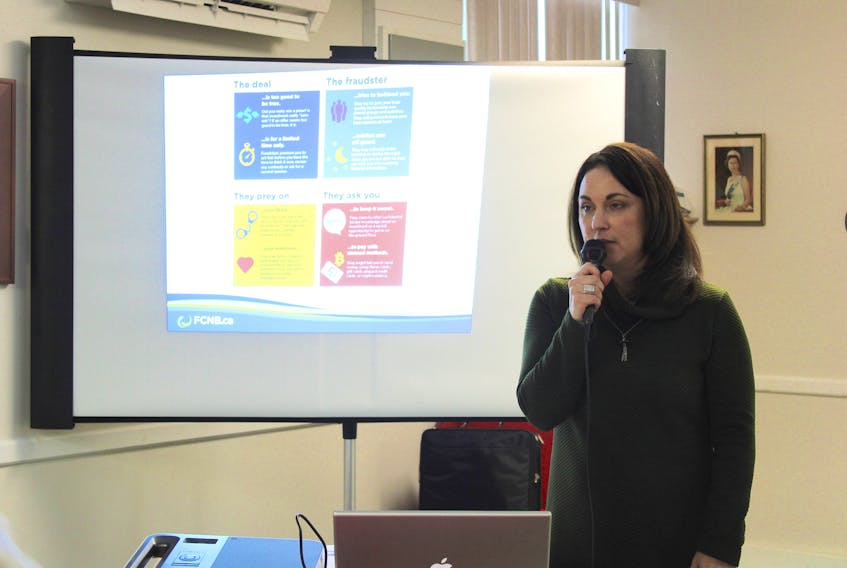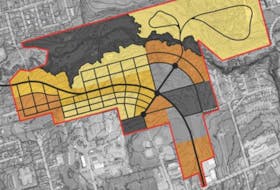PORT ELGIN, N.B. — If it sounds too good to be true – it is.
A capacity crowd of area seniors, who turned out last week for the second in a series of monthly Lunch & Learn events sponsored by the Nursing Homes Without Walls initiative at Westford Nursing Home in Port Elgin, learned about the many ways people can be duped by fraudsters, regardless of their age.

Erin King, with the Financial and Consumer Services Commission (FCNB) in Saint John, talked to those attending the event held last Tuesday at the Baie Verte community hall, about how people of all ages can protect themselves from becoming victims of the many types of fraud taking place in society today.
The FCNB is a provincial agency offering information and assistance to help all residents, regardless of age, to protect themselves and their financial assets from would-be fraud.
“First of all, it’s important that if any persons believe they may have fallen for a scam – report it to us, either by phone or on our website. We know a lot of people who may have been victims of a scam may be too embarrassed to tell anyone, but we understand and can help you deal with it,” King said.
The FCNB regulates some 34,000 businesses who handle about $30 million of customers’ money each year in New Brunswick. They regulate businesses dealing with pensions, insurance, investments, loans and trust companies, co-operatives, credit unions and consumer affairs companies such as real estate agents, mortgage brokers, payday lenders and collections agencies, among many others. It also responds to consumer enquiries and complaints.
King noted some of the many types of fraud today include those conducted in person, by phone or on the Internet.
“Always be aware. If someone contacts you and tells you that you’ve won a prize for something you didn’t even buy a ticket on, it’s a scam. If someone tries to pressure you into buying something – just say ‘no’, hang up the phone, or delete it from your phone or computer,” she said.
A scammer may also try to befriend you and gain your trust or by telling you things that might happen if you don’t do what they tell you to.
“They might try to blackmail you or tell you that you will be arrested, or they might also impersonate one of your family, such as calling you and pretending to be your loved one and saying that they’ve had an accident and need you to send money. They might also try to form a romantic relationship with you, tell you things that are lies, to gain your sympathy or they might ask for donations to a fake charity,” King noted.
She added that we should see a red flag if or when an online acquaintance asks for money, whether it be a loan or a gift.
“There was one gentleman in the province who was bilked out of $350,000 over a period of 18 months. His ‘new friend’ said she was visiting in Australia and her Canadian bank account wouldn’t release her money, so he kept giving her money, and it turned out she was a fraud,” King said.
Scammers may also ask you not to tell anyone else, and offer what they say is confidential information about some great money-maker or deal, or maybe some type of pyramid scheme where you need to get in on the ground floor. And then they tell you to pay for it using some unusual methods, like buying iTunes cards, pre-paid credit cards or bitcoin, a type of computer currency.
Many people attending the Lunch & Learn event agreed that they had been contacted by both phone and Internet by persons saying that their computer had a virus and offered to ‘fix it.’ Some also had been contacted by fraudsters impersonating Canada Revenue Service (CRA) personnel, saying that the person owed money for their taxes.
“Revenue Canada will never call you and tell you this; they will contact you by mail. And they will never, ever ask you to pay the alleged tax bill using an iTunes card or any other type of gift card. If you get this type of call, just hang up; it’s not real,” King urged.
She noted that currently there is a scam going on in New Brunswick where two men come to your door and offer to check your attic for mould. While one is talking to the home-owner, the second man is checking out the house for valuables – casing the place for possible future break-ins.
King also urged people to exercise caution when using online sites such as Facebook, Kijiji, dating or job search sites.
“There are some bona fide sites out there, for sure, but there are many that are just trolling for victims. Never give out your social insurance number or your banking information, or send money anywhere. Always be aware that there are scammers, and if it sounds too good, or if it doesn’t feel right or someone you don’t know asks for money; get out of the site, or hang up the phone and remember, you are in control of the situation,” she reminded.
For more information the Financial and Consumer Services Commission of New Brunswick can be reached by calling 1-866-933-2222 or by checking out their website at FCNB.ca
To contact Nursing Home Without Walls for information or to volunteer with the project, call 506-538-1904; email [email protected] and join the Facebook group online at www.facebook.com/nursinghomeswithoutwalls









